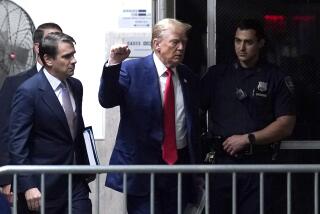Coercion at Issue in Andersen Trial
HOUSTON — Defense lawyers for accounting firm Arthur Andersen complained to a federal judge Wednesday that prosecutors were unfairly questioning witnesses about how investigators treated them during pretrial interviews.
Attorneys defending the firm against an obstruction-of-justice charge here asked U.S. District Court Judge Melinda Harmon to instruct federal prosecutors not to raise the issue with witnesses.
Prosecutors countered that the issue has become critical in the case because the defense claims that the government pressured some Andersen executives who might testify.
Andersen defense lawyer Rusty Hardin has raised questions about the prosecution’s treatment of witnesses many times during the trial. Hardin has accused prosecutors of intimidating potential witnesses by notifying them that they had become targets of the broader federal probe of Enron Corp.’s meltdown. He also has suggested that the government’s chief witness, David B. Duncan, the Andersen partner who was in charge of auditing Enron, pleaded guilty to a separate count of obstruction because of pressure from investigators.
The issue arose again Wednesday after former Andersen manager Jennifer Stevenson, responding to a question from Assistant U.S. Atty. Andrew Weissmann, said no one had pressured her to change her testimony.
Weissmann, responding to Hardin’s objections outside the jury’s presence, told the judge that he needed to raise the coercion issue because he expects the defense to use it in closing arguments.
Harmon did not rule on the matter. But the questioning signaled that prosecutors believe the jury’s impression of Duncan’s plea could be significant.
Duncan testified that he intended to impede a Securities and Exchange Commission inquiry when he directed subordinates in the Houston office to comply with Andersen’s document policy.
But on cross-examination, Duncan was unable to identify any specific information he intended to keep away from investigators.
As the defense continued, Hardin hammered at the idea that no one at Andersen believed that an instruction to comply with the document policy was an implicit directive to shred potentially incriminating documents.
A former auditor in the firm’s Portland, Ore., office, which handled audits of an Enron affiliate, testified that he received a reminder of the firm’s policy last fall and instructed his team to retain all Enron-related papers.
Shane Philpot said he asked his bosses about a voicemail he received instructing auditors to “clean up” records related to the affiliate, Portland General Electric. He said supervisors advised him that the policy is “not a document destruction policy.”
Prosecutors introduced an e-mail sent Oct. 24 by Peter Kwong, an Andersen auditor in Portland, to a member of the Enron audit team in Houston, that said, “All items in my possession as noted in your voicemail to me have been deleted or destroyed.”
But another Andersen official, Tim McCann, said Philpot had replaced Kwong on the Portland General account a year earlier, and Kwong had no connection to Enron or the subsidiary when he sent the e-mail. McCann said he knew of the SEC’s informal inquiry into Enron when he decided to retain Enron-related files, but that he made the decision primarily because the team had just completed its audit work on Portland General Electric.
More to Read
Inside the business of entertainment
The Wide Shot brings you news, analysis and insights on everything from streaming wars to production — and what it all means for the future.
You may occasionally receive promotional content from the Los Angeles Times.










